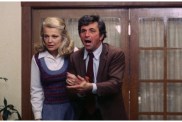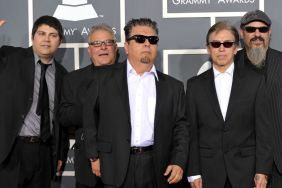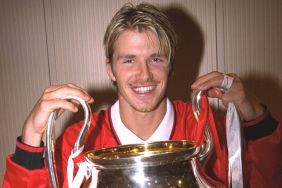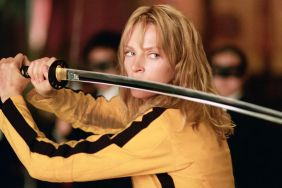Hopefully, those who read our interview with Andrew Garfield, the star of Boy A, have clicked through to read this interview with director John Crowley, who is reteaming with his Intermission screenwriter Mark O’Rowe for this poignant crime-drama. Boy A is a very different movie than their previous collaboration, not just because it’s set in Manchester rather than Ireland, but because it’s more focused on one specific character with scattered others around him. It’s very much the kind of movie you might expect from someone so well versed in theater who has been able to bring those sensibilities, similarly to the work of Richard Eyre (Notes on a Scandal).
Crowley’s also a part of the burgeoning Irish playwright scene that spawned Martin McDonagh, writer and director of In Bruges. In fact, Crowley was nominated for a Tony for directing McDonagh’s “The Pillow Man” on Broadway.
ComingSoon.net got on the phone with Crowley as he was finishing his follow-up movie Is There Anybody There?, which we also discussed briefly, as we talked about how his theater background helped to make Boy A.
ComingSoon.net: I know you worked with screenwriter Mark O’Rowe before on “Intermission.” Did you know this novel before you learned he was adapting it?
John Crowley: No, it was the other way around. Mark was brought the novel by Channel 4 basically to adapt, so that’s how that came about. I came to it quite late really, because I had a gap literally in my schedule. I was working on another screenplay with Mark and I knew all the time that I was working on that one, which we’re still working on, and he was writing “Boy A.” Channel 4 heard I had a gap in my schedule and came to me and said, “Look, we were going to do this next year but were going to do it this year. Any chance you’d take a look at it?” I did, I loved it and we were into pre-production pretty much within a month.
CS: How did you first meet Mark? I know you have a background in theater but where did he come from?
Crowley: Theater as well. Mark started as a playwright and I saw a play that he wrote, it was on at the Bush Theatre, which is this tiny theatre above the pub here in London, called “Howie The Rookie.” It was the first play Mark had written which came to some prominence. He had written two or three other plays, but this was the first one that broke out of Dublin. I was absolutely blown away by it, so I phoned his agent and asked me if he’d meet me for a drink. The next time I was in Dublin, we met for a drink and that’s sort of how we started a dialogue about possibly working together on a film. Long story short, about six months later, he sent me a first draft of “Intermission,” which we subsequently made.
CS: He’d been writing “Boy A” before you got involved so when you came on board, did you feel you had to change a lot to be able to make the movie?
Crowley: Not a lot of things, no. There were a handful of notes I had. There were a couple scenes that we cut completely, and there were a few other bits and pieces that we just wrote up and clarified. It was in really good shape and impressively so, because it’s his first adaptation outside of Ireland, as it were. It’s the first time he’s written in an English milieu, but the structure of it was particularly impressive, and he really had that cracked.
CS: Did it have to change a lot from the novel? The movie seems very cinematic rather than something based in literature, although I haven’t read the novel.
Crowley: The novel did jump around in time and did have the idea that as the novel progressed, the more it went forward, the more you found out about the actual events in the past itself. It did have that similar structure of the present tense moving forward and revelations getting ever more detailed towards the fateful event next to the river. However Mark had filleted it very cleverly, and had basically thrown out… the novel has so much more detail, but he had cut it down to the bits that were dramatically the most interesting and dramatized them rather brilliantly, and then he simplified it. The whole denouement of the novel was very different and the way in which Jack is revealed and that how comes about was much, much more complicated in the novel in the way that wouldn’t have played really very well. It would have taken forever to play out, and it didn’t have any tension. That’s where he really applied some brilliant work I think in that area.

CS: As far as filming the movie, did you approach it very different than “Intermission”? It does have a very different feel and look.
Crowley: Very different, very different. “Intermission,” given that it was about twelve characters, all searching for love basically in one form or another, had a crazy almost vortex. There was a wild energy to it. Given that we were shooting in rather unglamorous locations like pubs and supermarkets and buses and things, there was no point I felt in trying to for an elegant style in terms of shooting it. We deliberately shot (“Intermission”) on Super 16 and with quite a grainy stock and embraced the roughness and allowed the roughness of the filmmaking weave its way into the heart of the film. Whereas with this, it was much more different and I felt it needed to be a lot more observational and elegant. I wanted to hang back from Jack as a character. I wanted distance from him, and I wanted to observe him in his environment, because of the fact he was a character who was put into a new world. It was about finding a way of trying to look at Manchester and photographing it in a way that where the environment would become quite a particular part of the film. Secondly, in terms of the flashbacks, jumping backwards and forwards, I made a decision to not shoot that in a different style, which often times is what you would expect. For me, the whole film is about how the past is inescapable in the present and how the past is sitting on top of the present and he’s not allowed to go away. It didn’t feel like it wanted to be hermetically sealed in any kind of sepia-tinted glow. Rather, it needed to move in and out of the present narrative.
CS: The story makes you think about a lot of things like the penal system and rehabilitation and how someone like that could be in the wrong place and wrong time and lose most of his life. Were there specific things you wanted to bring out from the novel and examine further?
Crowley: You mean thematically? There are so many things in there, aren’t there? There were certain elements of Jack’s character that we wanted to basically find visual ways of expressing and one of those was the secrecy and his desperate wish and need to tell people who he really is, and the simultaneous horror and terror of what that would entail if he ever did do that. That concept is very close to the heart emotionally of why people latch onto him and root for him and Andrew was really good at that. His desperate need to find ways to express himself at times and his inability to do that is something which is quite interesting and we had some fun playing with that in the actual acting, but it just looks quite casual and quite natural, almost as if he’s stuttering over words, but a lot of that was carefully worked out actually.
CS: I know you saw Andrew on stage in a play but what was it about him when you saw his tape or talked to him that made you know he was the right person to play Jack and pull that stuff out?
Crowley: I’d seem him on stage a year before, so I knew how good an actor he was, but he put himself on tape as an audition for us because he was doing “Lions for Lambs” when we were auditioning here in London for the film. We’d seen quite a few actors for the part and what he had was he had a degree of vulnerability about him. He drew you in, you cared about him, and also, there was an inner life that was available to you. You knew there was stuff going on behind those eyes, and he wasn’t just acting the lines as it were. Those were the key elements that I was looking for. You absolutely had to have that and had to have a sympathetic actor in that role or otherwise, you wouldn’t have a chance of an audience caring for him. Given the amount of stuff he left unsaid in the film, you did need somebody who was sophisticated enough to be able to play subtext and be able to do glances and with body language express an inner conflict that was going on in there, that the world wasn’t quite spotting but that we were understanding more about him as the film unfolded.
CS: As far as casting the younger actor to play Eric, how did you approach that and did you have to base him on the fact you already picked Andrew to play Jack?
Crowley: Again, with children actors, that can be quite hard, especially in material which is as dark as this, because it whittled down very quickly, to be honest, to a very small pool of kids who were simply good enough to be able to handle material like this and not be cutesy about it, and were smart enough to handle it in a way that you knew they’d be faithful as well. They just sort of emerged very quickly as the two kids who were best-suited for it, really, is the truth.

CS: Andrew mentioned that Peter had some experience as a case worker with troubled kids as well. Did you know that when you cast him?
Crowley: Right, I don’t know how close to the actual case itself. He alluded to it once or twice while we were in rehearsals, but I don’t think it was anything as serious as the case that we were working on. The thing about Peter is that what he brings to any role is an unerring nose for truthfulness. He’s an incredible anchor and he’s such a strong anchor in everything.
CS: I was surprised you already shot another movie since finishing this one. What’s this other movie and does it follow any of the themes you’ve explored in “Boy A” or “Intermission”?
Crowley: No. Even though it’s got a kid in the middle of it, it couldn’t be further from it. It’s basically the project that got moved back which allowed me to do “Boy A” which is why I did two films back to back. It’s called “Is There Anybody There?” and it’s set in a retirement home in the north of England in the 1980’s and Michael Caine became attached to it two years ago and said, “Yeah, want to do it but I basically have to go and do Batman first” so that basically left us with seven months before we actually got to it and I did “Boy A” in the meantime. So when I was at Toronto with it last year, we were already in pre-production on “Is There Anybody There?” so I only was able to nip in for a couple days, and we’re just finishing the sound mix now, and it’s got Bill Milner, one of the kids from “Son of Rambow,” and it’s about a child growing up in a retirement home and his friendship with an elderly, retired magician, who moves into the home but doesn’t want to be there, and who’s foul-mouthed and quite rude, and it’s a jet black comedy really about death and growing up.
CS: Do you think it’ll premiere at Toronto? That seems to be your favored festival to show off your new movies.
Crowley: I love Toronto, yeah. (chuckles) We were there with “Intermission” and “Boy A” and who knows if we get this one finished in time, I’d love it to go there, but yeah, I love the city and I love the festival there. I think it’s really cracking.
CS: I didn’t realize until I found out I was going to talk to you that you directed Martin McDonagh’s “Pillow Man” which I heard so many good things about him. Do you two keep in touch and do you have similar sensibilities and plans to work together again?
Crowley: Yeah, he’s a good mate of mine and I suppose there is a certain black humor there, which isn’t necessarily there in “Boy A.” Mark shares a similar sense of humor as well, which is finding humor in odd places, and a love of good dialogue. I love Martin McDonagh. I think he’s such an incredible playwright, great playwright.
CS: Were you able to approach “Boy A” at all like you might a play in terms of rehearsing the actors? There’s a lot of scenes of Andrew just sitting there thinking and I was curious whether that was rehearsed or was it important to just catch it on film as quickly as possible at the moment?
Crowley: No, we rehearsed for a week very fully. Because Andrew had come from a theater background, he rehearsed… a lot of the scenes in the film are actually two-handers and they’re dialogue scenes, so it did break down into rehearsable chunks very neatly. I had all the cast for that week, so I was able to rehearse quite intensely. I would rehearse it with them, which is not necessarily the way you’d rehearse a play, but I’d rehearse it with them to the point, but short of the point of breaking the emotion of the scene out. Whereas when you’re rehearsing a play, you’re trying to create a moment and then find the conditions that will allow a performance to recreate that moment 8 times a week for the next two to three months maybe. Whereas, when you’re doing film, you just want the moment to happen once, truthfully, and make sure the camera has film in it and it’s in focus, and that’s all you have to, for one moment. With this, where the territories were quite contextual and you wanted to be very much in control of the difference with what was being said and what was really going on in a scene, we would rehearse quite intensely with that. Andrew was able to access all of that stuff, and we did rehearse in extreme detail, but not emotionally, if that makes sense. We would keep it slightly cooler than you want on the day, so when the camera starts rolling, that is the thing which supplies the heat that makes the chemical reaction actually happen at the last moment.

Then there were other scenes, which I think you were alluding to, where he’s in his room on his own, which we very much leave for the day. That would be about discussing with him where his head was at, and getting him into the right frame of mind and then basically just letting the cameras roll and going for it for as long as there was film in the camera, and then editing it afterwards to suggest the psychology of the leaps and the jumps in his head that were going on. He’s effortlessly able to do both, to be a very, very detailed, very specific, text-based actor and also able to just simply, once he knows what the character is and where his head is at, to play it fast and loose and improvise in front of the camera for as long as you need.
CS: Your last two films have been very localized to Ireland and England, so have you thought about making a movie set elsewhere and have you visited other places where you might want to shoot or is it more important to introducing that section of your country to the rest of the world?
Crowley: Absolutely. There are a couple of things that I have in development which are not set in Ireland and England, and a few more which are set here. No, for me, it’s all about what the internal story is, rather than the setting of it, and how strong you can plug into that and let your sensibilities feed into it, rather than necessarily expressing everything either about you anecdotally in the world or emotionally in the world. It’s just very important to have an emotional connection to the inner life of the film. Then you can begin to find images that gather around that core, and begin to express the core of it. I really do work from the inside out, but I get sent a lot of stuff from America, but I find it hard to find stories which are distinctive enough to want me to engage with them. I tend to get drawn to stuff which is outside the boundaries of genre, which sort of collapses various genre into one, and that’s not what a lot of films are, I guess. I sort of search in the margins for unusual material and for characters that you find compelling and interesting.
CS: Do you have any idea what you might potentially do next from the movies you’ve been developing?
Crowley: I do, but I don’t actually know which one I’m going to do is the honest truth. I know what I really want to do is have a holiday (chuckles) which I’m going to do in about three weeks’ time, as soon as this film is finished, because I literally did go from “Boy A” straight into the other film. Other than that, I actually don’t know. I may go do a play quickly.
CS: I was curious whether you’d want to do more theater to break up this string of films.
Crowley: Possibly, quite possibly. I mean, again it all depends on the material. I stopped doing old plays a long time ago and I’m only really interested in new work, but it’s a very nice thing to do and balance, and I’m lucky enough to be able to do that, to jump between theater and film. They’re very complimentary muscles really, and it’s nice to go back to one after having done a swell of the other.
CS: A movie could be nine months to a year of your life or more, but what kind of commitment does directing a play entail to get that going?
Crowley: Much less. Usually, you’d rehearse for five weeks and maybe preview for a week or two and then it’s open, but casting it can take a bit of time. Unlike films, plays do tend to happen. A film can keep sliding back and your life can be on hold for a year before you even get any bit of directing done at all, but theaters, the buildings exist and they tend to need plays to go on, so everybody agrees that the play will open on that date and come hell or high water, there will be a cast, there will be a set and there’ll be audience there in front of it. So it’s a very different rhythm, and that’s quite nice. There’s an absolute deadline there and you know it’s going to happen. After the endless deadline that can sometimes be part of making films, it’s refreshing to be able to do that, and then you get the immediacy of it, of course. The actors are there on stage, the audience is there and the presence of all of that is fantastic.
Boy A opens in New York at the Film Forum on Wednesday, July 23 and in L.A. on Friday, July 25.









